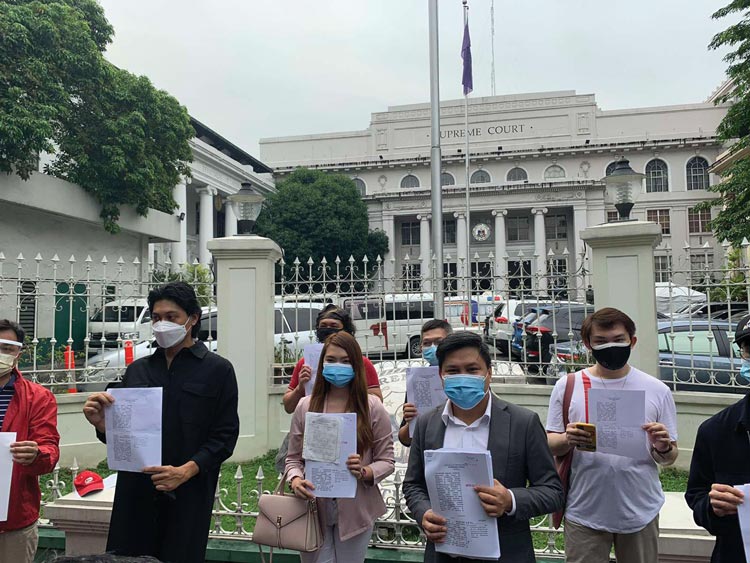
Bloggers, social media influencers, and other Internet personalities have joined lawyers, journalists and human rights advocates who are rallying against the Anti-Terrorism Act of 2020, which recently became a law.
Under the group called “Concerned Online Citizens,” 19 vloggers (video bloggers), bloggers, advocates, artists, writers and community managers filed the 21st petition against the controversial law asking the Supreme Court to strike down certain provisions of RA 11479 and stop their implementation.
“The Philippines, including our portion of the Internet, must be free,” the group said on Wednesday, July 29.
“We are reminded that our rights, whether offline or online, should be protected,” they added.
The group’s petition highlighted the new law’s impact on internet freedom, pointing out that Filipinos who are online mostly on social media can become victims of the law’s vague definition of terrorism and acts of terror.
“One can easily be tagged as a terrorist or terrorist sympathizer, or terrorist enabler and anyone may be subjected to surveillance, attack and even to peddled fake and false news against their persons,” Rodel Taton, the lawyer of the petitioners, said in a statement.
The group also asked the SC to declare the following provisions as unconstitutional:
• sections 4 to 6 and 9 to 12, which defined terrorism and related offenses;
• sections 25 to 27, which allowed the Anti-Terrorism Council to designate, and the Court of Appeals to preliminarily proscribe terrorists or terrorist groups on the basis of suspicion; and,
• section 29, which allowed detention without judicial warrant of arrest.
“It cannot be overly emphasized that the new Anti-Terrorism Act is highly questionable for its vague and overbroad definition of ‘terrorism,’ which may lead to the capricious and arbitrary application by law enforcers and may chill the people to silence,” the group said.
The petitioners added that actions like being tracked down, followed, or investigated or having their messages, conversations, discussions, spoken or written words tapped, listened, intercepted and recorded through various means “are violative of their constitutional rights to privacy, free speech, free expression and their right against unreasonable searches and seizures.”
“The Anti-Terrorism Act presents a clear threat on the free exercise by the citizens-netizens of their fundamental right to speak on issues of national importance, albeit online,” they said.
The group also described the law as “sword hanging over the heads of citizens who are now mostly conducting on the Internet interactions, transactions, commerce and business, media consumption, availment of government services, and public debate on national issues.”
Among the petitioners are online personalities Mark Averilla (Macoy Dubs) and Marita Dinglasan (Aling Marie), spoken word artist and writer Juan Miguel Severo, blogger Jover Laurio (Pinoy Ako Blog), blogger and columnist Tonyo Cruz, blogger and former lawmaker Mong Palatino, mental health champion Dr. Gia Sison, and Ian Porquia (Reklamador Facebook Page).
“This is a fight for and on behalf of 73 million online Filipinos. If we do not fight and if the court won’t take action, the terror law could easily be used to stifle Internet freedom in the guise of fighting terror,” they said.
“The government has been using the Cybercrime Law before to silence critics, even ordinary citizens. The terror law is the new weapon of a tyrannical government,” they added.








